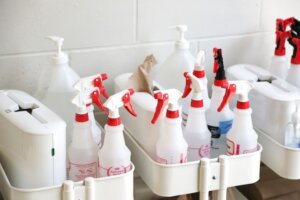Cleaning Products Used by Expert Trauma Cleaners | AllAces
Cleaning Products Used by Expert Trauma Cleaners | AllAces
Key Takeaways
- Specialised Cleaning Agents: Trauma cleaners use a range of specialised cleaning products, including biohazard disinfectants, enzymatic cleaners for breaking down organic matter, and industrial-strength deodorisers to manage odours.
- Safety and Protective Gear: Essential safety gear for trauma cleaners includes protective suits, gloves, masks, and eye protection to safeguard against exposure to harmful substances.
- Advanced Cleaning Technologies: Techniques like using HEPA vacuums to remove particulates, steam cleaners for sanitation, and foggers for reaching inaccessible areas are crucial in trauma cleaning.
- Professional Training and Certification: Trauma cleaners often require certification from bodies like the Institute of Inspection, Cleaning and Restoration Certification (IICRC) to ensure they are proficient in handling hazardous materials and equipped with the latest cleaning techniques.
- Psychological Support: Due to the emotionally taxing nature of their work, trauma cleaners may need psychological support to help them cope with the stress and trauma associated with their job duties.
Summary
This article explores the specialised tools and cleaning products used by trauma cleaners, highlighting the importance of protective gear, advanced technologies, and enzymatic cleaners for effectively managing biohazards. It emphasises the need for professional training and psychological support for cleaners dealing with traumatic environments, ensuring they are both skilled and supported in their challenging roles.
When it comes to trauma cleaning, the stakes are high and the requirements are stringent. Expert trauma cleaners are called upon to tackle situations that go far beyond everyday cleaning challenges, dealing with scenarios ranging from crime scenes to biohazard contamination. This article delves into the arsenal of cleaning products and tools that these professionals use to safely and effectively restore environments to a safe state. Understanding the complexity and necessity of their equipment sheds light on the critical work performed by trauma cleaners.
The Essentials of Trauma Cleaning
Understanding Trauma Cleaning
Trauma cleaning encompasses a wide range of situations, each demanding a unique approach and specialised tools. It involves cleaning sites where incidents such as accidents, deaths, or violent crimes have occurred. The main goal is to eliminate health hazards and restore the site to a non-traumatic state.
Safety First: Protective Gear and Equipment
Before discussing cleaning products, it’s crucial to highlight the safety gear that trauma cleaners wear. This includes protective suits, gloves, masks, and eye protection, which are essential for preventing personal exposure to harmful substances.
Specialised Cleaning Agents
Biohazard Disinfectants
These are critical in trauma cleaning for disinfecting areas contaminated by biological materials such as blood and bodily fluids. Products like Sporicidin, CaviCide, and Bleach solutions are commonly used.
Enzymatic Cleaners
Enzyme-based cleaners play a key role in breaking down organic matter. These are particularly effective in removing blood, faeces, and other bodily fluids without damaging surfaces.
Deodorisers
Industrial-strength deodorisers are necessary to address the odours that often accompany trauma scenes. These may include ozone machines and hydroxyl generators.
Heavy-Duty Cleaning Solutions
Solvents and detergents capable of removing grease, oils, and other stubborn residues are essential, especially in areas where decomposition has occurred.
Absorbent Materials
Products such as absorbent powders are used to manage liquid biohazards by solidifying them for safer and easier cleanup.
Techniques and Tools for Effective Cleanup
Mechanical Tools for Trauma Cleaning
Steam Cleaners
High-temperature steam effectively sanitises and cleans surfaces, reaching areas that are difficult to disinfect through other means.
HEPA Vacuums
HEPA-filtered vacuums are crucial for removing fine particulate matter that can be hazardous to health, ensuring thorough cleaning of all surface types.
Advanced Cleaning Technologies
Ultraviolet Light
UV light is sometimes used for its germicidal properties, helping to eliminate microscopic pathogens from the environment.
Foggers
Fogging machines are used to disperse disinfectants in hard-to-reach areas, ensuring a comprehensive reach.
Trauma Cleaners
Role and Responsibilities
Trauma cleaners play a pivotal role in not only cleaning but also in ensuring that the areas they disinfect are free from any biohazards and safe for human occupancy. Their work often involves collaborating with law enforcement and health officials to ensure that all protocols are followed meticulously.
Ethical and Sensitive Approach
Handling trauma scenes requires not only physical and technical skills but also a high degree of empathy and respect for the affected individuals and their properties. The cleaners must navigate these challenging environments with care and respect for all parties involved.
Maintaining Standards in Trauma Cleaning
Certifications and Training
Professional trauma cleaners are often certified through organisations like the Institute of Inspection, Cleaning and Restoration Certification (IICRC). This training ensures they are equipped with the latest cleaning techniques and compliance with health and safety regulations.
Continuous Improvement and Best Practices
The field of trauma cleaning is continually evolving, with new products and technologies emerging. Professionals in this field often participate in ongoing education to stay abreast of the latest developments and improve their practices.
Frequently Asked Questions about Trauma Cleaners
What qualifications do you need to become a trauma cleaner?
To become a trauma cleaner in Australia, individuals typically need to undergo specific training in biohazard cleaning and earn certifications such as those from the IICRC. These programmes focus on the safe handling of hazardous materials and the proper use of cleaning chemicals.
How do trauma cleaners deal with the psychological impacts of their work?
Trauma cleaners often face significant psychological stress due to the nature of their work. Many employers provide access to counselling and mental health support to help them cope with the traumatic aspects of their job.
What is the most challenging aspect of trauma cleaning?
The most challenging aspect of trauma cleaning is often dealing with the emotional and psychological impact of cleaning
Why Choose AllAces?
AllAces Cleaning & Restoration has over 35 years of industry experience handling extensive trauma projects across Brisbane, Sydney, Melbourne and surrounds. Our IICRC-certified trauma cleaners are highly trained and experienced utilising the latest technology and equipment to ensure the return of a safe and healthy environment.



